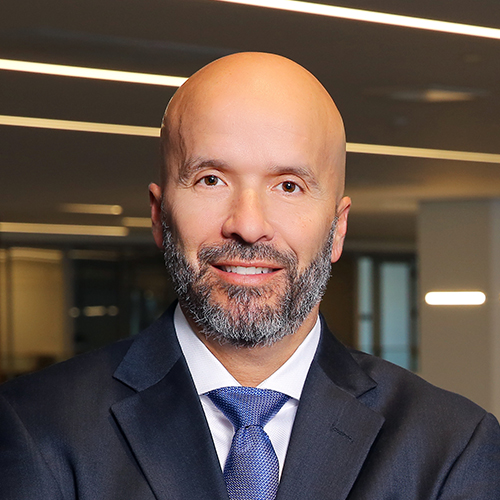|
Getting your Trinity Audio player ready...
|
After earning his JD from Stanford Law School and joining the workforce, Bernardo Silva realized that working at a private law firm wasn’t speaking to his passions. Luckily, he discovered a job listing for a corporate lawyer at Sony Music Entertainment, “no corporate experience required.”
“You don’t see opportunities like that anymore,” says Silva, who is now vice president, business affairs and legal counsel at Disney Music Group. “Sony gave me the chance to learn the nuts and bolts of the music industry as I went—including the legal work that contributes to helping the company run its business.”
Silva had always had an interest in music. He grew up with five older siblings who all shared a love of music. Because of the range of their ages, he listened to everything from classic rock to punk and new wave. He and two of his brothers were also avid guitar players.
At Sony, Silva got an inside look at the industry. He gained valuable experience negotiating and drafting a range of different types of agreements that covered everything from recording contracts to soundtrack distribution. He also learned the nuances of the music business, such as how artist royalties are calculated and what deductions are taken from those royalties for items such as recording costs, packaging, and breakage, a term historically related to vinyl records and lost inventory resulting from units damaged during shipment.

But when the online digital music world appeared, the traditional music industry initially panicked, Silva says. In 1999, the Recording Industry Association of America (RIAA) sued the peer-to-peer music sharing website Napster and ultimately shut down the site, but legal action couldn’t stop CD sales’ long, slow decline.
As record labels went through successive rounds of layoffs, Silva decided he needed to find a more secure environment. He landed at Paramount Pictures, where he again learned from the ground up, this time about the business and legal aspects of how music is used in films. His work was now focused on agreements for work-for-hire music content for studio projects and related soundtrack releases. “Representing a film studio definitely felt more secure because music is just one component—although a critical one—of their primary offerings,” Silva says.
Now at Disney, he is responsible for overseeing the business and legal affairs of Disney Music Publishing (DMP). One primary focus of Silva’s job is to close deals that monetize the company’s extensive catalog of musical compositions – from “Spoonful of Sugar” to “Let It Go”—through various commercial uses. Historically, Disney had a reputation for being extremely proprietary about its song catalog, but his work is part of company efforts to actively recalibrate its strategic approach to music licensing.
“Disney wants its music to be heard and is receptive to negotiating deals for outside uses as long as those deals make sense from both a business and brand perspective,” Silva says. “The more of these types of exploitations of our song catalog we can facilitate, the more we can contribute to the bottom line.” Those uses include deals with a varied range of digital service providers including Apple, Facebook and Google, print music publishers, and non-Disney commercial advertisers.
The team that Silva manages performs a range of copyright administration activities in the music publishing space. This includes everything from negotiating and inputting splits for individual songs (details on how the ownership and future royalties are divided among the songwriters and publishers) into DMP’s rights and royalty-management system to creating cue sheets (detailed logs on writers, publishers, duration, and use type for any music appearing in film or television).
When it comes to technology in the industry, Silva admits that legal departments often play catch-up to innovative music formats, platforms, and uses. For example, the transition from downloaded purchases of individual songs to streaming music services has led to a proliferation of new companies attempting to capitalize on how listeners consume music. In stark contrast to the industry’s lack of insight into the digital music environment more than twenty years ago, Disney is more open to considering the possibility of issuing provisional or limited licenses to start-ups that are eager to engage music rights holders early in their companies’ development.
“Entertainment companies always try to anticipate the next big thing,” Silva points out. “To help nurture relationships and to protect our intellectual property, we can provide shorter duration limited licenses or licenses tied to milestones that can trigger more extensive rights or a longer term when values and overall parameters are clearer.”
Even with so many business processes and a constantly evolving business landscape, Silva is committed to being an educational resource for others. He is involved in outreach to local law schools and is actively involved in the company’s Disney Lawyers of Color affinity group.
Silva has become a seasoned music business professional over the course of his career, but he continues to learn every day. He points to how energizing it can be to realize that an industry development in Germany or Japan tomorrow can impact the company’s bottom line six months or a year later.
At heart, though, he remains a true music fan. He still gets excited about being able to sit in on a score recording session with Quincy Jones; about negotiating deals for industry titans like Randy Newman, Hans Zimmer, and Kristen and Bobby Lopez, the songwriting powerhouses behind Frozen and Coco; and having had producer, writer, performer Moby accidentally wander into his office and chat about music.
“No matter how long I do this,” he says, “there’s something exciting about riding in the elevator with Richard Sherman, who cowrote songs for Mary Poppins and The Jungle Book, or with Ozzy Osbourne as part of my day at the office.”

